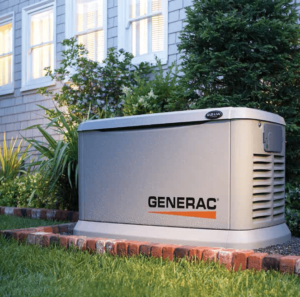Emergencies that leave you without power can happen at any time. This is why it is always a good idea to have a generator available. While portable generators can be useful, backup generators are even more so due to their convenience.
For lake home properties, they’re even more valuable for a variety of reasons. These include ease-of-use, safety, and quiet operation.

Automatic Power Generation
Standby or backup generators come on automatically as soon as the power goes out. This is a very convenient feature on a lake home, especially one that’s occupied year round.
Never again will you have to worry about arriving at your lake home, only to find out it’s without power. Rather than struggling to hook up a portable generator, you can immediately begin enjoying your waterfront property uninterrupted.
Hooking up portable generators can be hazardous near bodies of water, since you need to make sure cords don’t get wet. If you’re already in the dark, you run the risk of doing just that. However, keeping cords dry won’t be a concern when you rely on a backup generator.
Quiet Operation
Portable generators tend to be very loud, and may even be disturbing at times. Standby generators on the other hand operate very quietly, so you won’t be disturbed while operating them. The fact that they produce very little noise makes them ideal for lake homes because they won’t overwhelm the neighborhood or the tranquil setting with too much noise.
LP or Natural Gas
Ensuring your generator has an adequate fuel source is key to its operation. Since portable generators typically run on gasoline, finding fuel for them can sometimes be a challenge. Standby generators can be tied into your existing natural gas lines so that fuel is continuously being pumped into them. If you don’t have natural gas lines, you can connect them to LP gas tanks that hold enough fuel to power your home for several days, which means:
- No need to store extra fuel
- You won’t have to stand in line to get fuel to power your generator during a power outage
- Traveling long distances to find fuel won’t be necessary, which could be an issue if your lake home is remotely located
Safer Operation
In order to operate a portable generator safely, you need to be able to accurately calculate the voltage of appliances and other electronics. Miscalculating load capacity could result in damage to your equipment, or even worse, injury or death. While backup generators will require that their load-bearing capacities be verified by an electrician before installation, they are much safer to operate compared to portable generators.
No Venting Required
Portable generators must either be operated outdoors or vented properly if used indoors. As a result, you could find yourself needing to open windows or doors to allow exhaust to escape or make room for power cords. Standby generators eliminate the need for venting, so you won’t have to worry about tripping on cords or having cold air from an open window enter your lake home.
Backup generators can certainly come in handy, especially at lake properties. An investment in the right standby generator is something that will allow you to enjoy life on the water to its fullest, even when others are struggling and without power.

